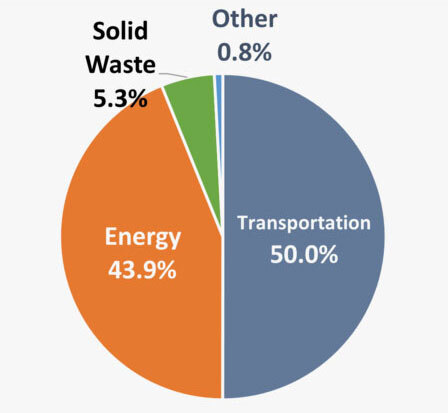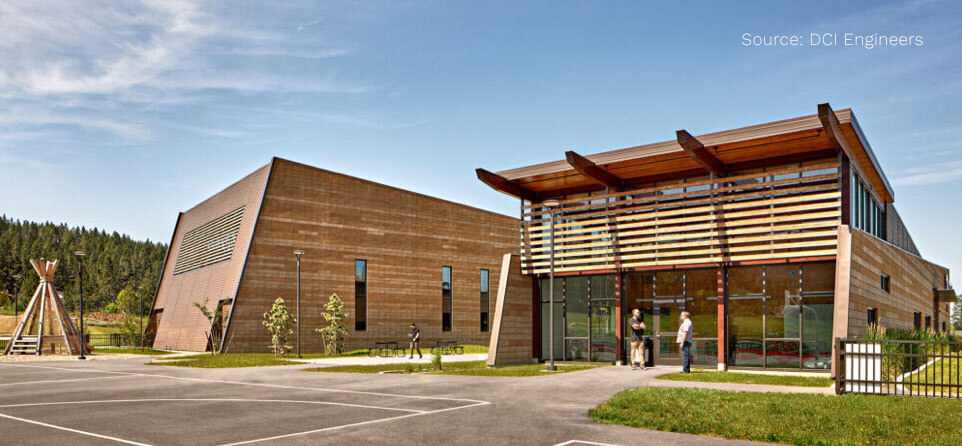
We here at UCUT have pulled together to create a plan to reduce our carbon emissions! Here, you will learn about the process we have gone through, how we are planning to reach our goal, and why.
UCUT has been awarded funding through the Environmental Protection Agency (EPA) Climate Pollution Reduction Grant and hired Resource Synergy, a Northwest-based environmental consulting firm dedicated to reducing costs and increasing the ability of their clients to reduce carbon emissions. UCUT and Resource Synergy are coordinating, developing, and assisting in reaching the carbon reduction goals of each Tribe through the following steps:
- Complete greenhouse gas inventory to identify top pollution emission sources.
- Identify actionable measures to reduce carbon emissions.
- Create an actionable plan to reach the set goals.
- Implement!
The goals within this planning grant are to create 3 documents through 3 phases.
Phase 1 – Create the Quality Assurance Priority Plan (QAPP)
This plan identified the sectors that are applicable to the UCUT Tribes, the people that will be at the helm to lead the discussion and analyze data and set the guidance to create a solid greenhouse gas inventory for our area. Below is a list of the sectors identified along with their sub-sectors.


Phase 2 – Create a Priority Climate Action Plan (PCAP)
This plan includes the greenhouse gas inventory results and takes this data into consideration to identify the best projects for our Tribes that will have the greatest impact on reducing our carbon footprint. Here are the results of the inventory done on all 5 Tribes that assisted in identifying key projects that would benefit multiple communities.

Project Highlights
Tribal Residence Decarbonization Program
Tribal residences represent approximately 25,361 tCO2e per year of emissions throughout the UCUT member tribes. This measure will provide capital to reduce emissions from residences, with a focus on installing energy-efficient heat-pumps, including geothermal where prudent, and improved equipment as a replacement to wood stoves, propane, and electric resistance heat in tribal residences throughout each of the UCUT member tribes. Heating and cooling homes is quite energy intensive, and in most U.S. homes space heating is the largest consumer of energy, with water heating typically being the second. Heat-pumps are a more efficient heating and cooling system for regulating the air and water temperature in homes. There are also substantial added economic benefits for homeowners, and this program will significantly contribute to the overall goal of improving tribal members’ lives. It is worth noting that this program will be optional for tribal members, as it is acknowledged that there are significant cultural and aesthetic values associated with wood stoves, despite their potentially harmful emissions.
Commercial and Industrial Decarbonization
According to UCUT’s GHG inventory, commercial buildings and industry represent approximately 18,279 tCO2e of emissions. Therefore, the need for efficient and updated infrastructure throughout member tribes is significant. Currently, many buildings have outdated building systems and envelopes to the point where significant retrofits are needed to lower operational costs and provide occupant comfort. This decarbonization strategy will implement an energy efficiency program for all tribally owned commercial and industrial operations through energy audits, retro-commissioning, and retrofits/replacements. This program will be supplemented with other available state and federal rebates/incentives for replacing or retrofitting building equipment.

Unified Forest Management Plan
Sustainable forestry is a vital part of the fight against climate change and making sure future generations can enjoy all the benefits that forests and trees bring. The UCUT will develop a unified forest management plan that incorporates Tribal Ecological Knowledge (TEK) and modern forest management practices to reduce the incidence of megafires, enhance carbon sinks, and maintain healthy forests.
Carbon Smart Transportation
The GHG inventory for the UCUT member tribes revealed that around 50% of their emissions (not including forestry) were a result of transportation, especially employees commuting to workplaces such as tribal headquarters or casinos. Therefore, this measure will serve to reduce emissions caused by commutes by incorporating tribally funded rideshare programs with a preference towards utilizing electric vehicles such as vans or buses. The implementation of this measure will include education of staff, carbon smart bus routes, and engagement programs to increase knowledge and ridership.
All forms of hybrid and full electric vehicles (EVs) can help improve fuel economy, lower fuel costs, and reduce emissions. However, the adoption of fully electric and hybrid vehicles can be hindered by high up-front costs to replace old vehicles and a lack of EV charging infrastructure. Therefore, UCUT also intends to fund the replacement of appropriate tribal fleet vehicles with EVs and install electric vehicle charging infrastructure for workplace, home, fleet, and public charging throughout tribal lands.
A “complete streets” program will also be included in this measure. This is a transformative strategy in which the transportation network is planned, designed, built, operated, and maintained to enable safe mobility and access for all road users, including, but not limited to, pedestrians, bicyclists, motorists, and transit riders. This project(s) will focus on enhancing existing streets for non-motorized travel to reduce vehicle miles traveled (VMT) and subsequently GHG emissions.

Waste Reduction Programs
This measure will include composting and recycling programs to reduce waste that leads to more GHG production and methane emissions from landfills. The focus of this program will be on diverting organic waste due to the methane emissions associated with the breakdown of organic materials and other factors.
Green Construction Standards
Green building and transportation-applied standards help reduce negative impacts on the natural environment by using less water, energy, and other natural resources; employing renewable energy sources and eco-friendly materials; and reducing emissions and other waste. Therefore, the UCUT will support the development of a culturally focused community guidebook for new construction standards. This will include recommendations for building controls, envelopes, lighting, materials, heating/cooling, roads, pathways, safety implementation, and more with a focus on embodied carbon, energy efficiency, culturally valued resources, and resource use.

Phase 3 – Create a Comprehensive Climate Action Plan (CCAP)
This plan will take a deep dive into the projects identified in the PCAP and establish true costs and plans to implement them.
Stay tuned as this plan is being developed and will be completed by June 2025!
Here’s how you can support these measures starting today:
- Learn and follow recycling and composting guidelines for your area
- Start a backyard garden
- Consider transitioning to an EV when feasible
- Participate in community surveys
- Take part in programs for weatherization and HVAC upgrades